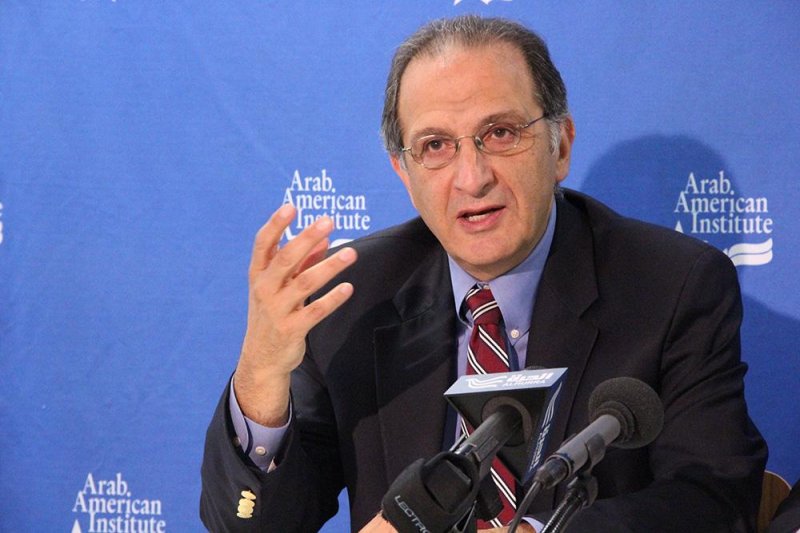(Alix Hines and Dima Ansari/MNS)
WASHINGTON, July 30 (UPI) -- A survey released Tuesday suggests there is a deep partisan divide in attitudes toward Arab-Americans and Muslim-Americans.
The Zogby Analytics online survey for the Arab American Institute asked 1,110 likely U.S. voters about their views of Arabs and Muslims.
"When we first started doing this polling we used to comment that there was a partisan divide," said James Zogby of the Arab American Institute. "What's clear is that the partisan divide only masks a generational divide and a racial divide."
Thirty percent of Democrats 54 percent of Republicans view Arabs negatively. When it comes to Muslims 33 percent of Democrats have an unfavorable view, while 63 percent of Republicans have an unfavorable view.
"For a part of the American electorate demonizing Muslims and Arabs is still a political winner," said Matthew Duss, a policy analyst at the Center for American Progress, a liberal-leaning think tank.
There are about 2 million Arab-Americans in the U.S. according to the institute. In North America there are 3.5 million Muslims, the Pew Research Center says.
The Zogby survey also showed younger Americans view Arabs and Muslims more favorably than the older generation.
![]()
(Alix Hines and Dima Ansari/MNS)
![]()
Alix Hines and Dima Ansari/MNS)
Experts at the institute event agreed the media play a role in conflating one-dimensional perceptions of Arabs and Muslims -- and that is where most Americans derive their views.
"The story plays out [as] be afraid of these people, they're dark, they're dangerous, and that, then has a component back here in terms of how it filters back to the public," Duss said.
Another reason for negative attitudes toward Arabs and Muslims has to do in part with religious and racial profiling by the government, Zogby said.
Racial profiling is defined by the Justice Department as the assumption that one race or ethnicity is more likely to commit a crime over another race or ethnicity.
The survey showed that a majority of Democrats say profiling isn't justifiable while Republicans say it is justifiable.
"I do think there needs to be a much tighter definition of profiling," Zogby said. "It is today accepted and tolerated because of the fact that the guidelines from the Justice Department make it acceptable practice."
According to a lawyer at the American Civil Liberties Union, the Department of Justice's Guidance on the use of race lays out guidelines to curb racial profiling by law enforcement. However, civil rights advocates say the guidance needs to be strengthened.
For example Nusrat Choudhury, a lawyer for the ACLU, says consideration of religion needs to be included in the guidance limiting profiling.
"That omission has persisted in the face of considerable and vocal opposition and advocacy by civil rights organizations for reform of the DOJ Guidance on the use of race prohibiting religious profiling," Choudhury said.
"The fact that the attorney general has not made this change in the 13 years since the 9/11 tragedy signals that the federal government is engaging in religious profiling."
An example of widespread religious profiling, according to Duss, is the New York Police Department's surveillance of vast communities of American Muslims beginning in 2002.
"It profiled hundreds of thousands of people, invaded the privacy of all these people, purely on the basis of their religion," Duss said.
He also said, it produced no evidence of plotted crimes.
In 2012, the then-New York City Mayor, Michael Bloomberg, told CNN that the NYPD pursued where there were allegations and that department was simply doing what it needed to do to keep the city safe.
Duss, author of a 2011 report, "Fear Inc.: The Roots of the Islamophobia Network in America," explained that Americans are more likely to have a favorable view of Arabs and Muslims if they know them personally.
Experts agreed that Americans who know Arabs or Muslims personally tended to reply differently. Statistics show that of the 47 percent of Americans who know Arabs or Muslims, or both, show a 33 percent increase in favorable attitudes.
Education and more exposure to Arab-Americans and Muslim-Americans can help change the attitudes of the American public, according to the survey.
The survey, taken in late June, had a margin of error of about 3 percentage points.
"Unfortunately we're not as well known, the media does not do as good of a job of telling the story of who we are, and so we've got work to do," Zogby said. "We've got a lot of work to do."

















